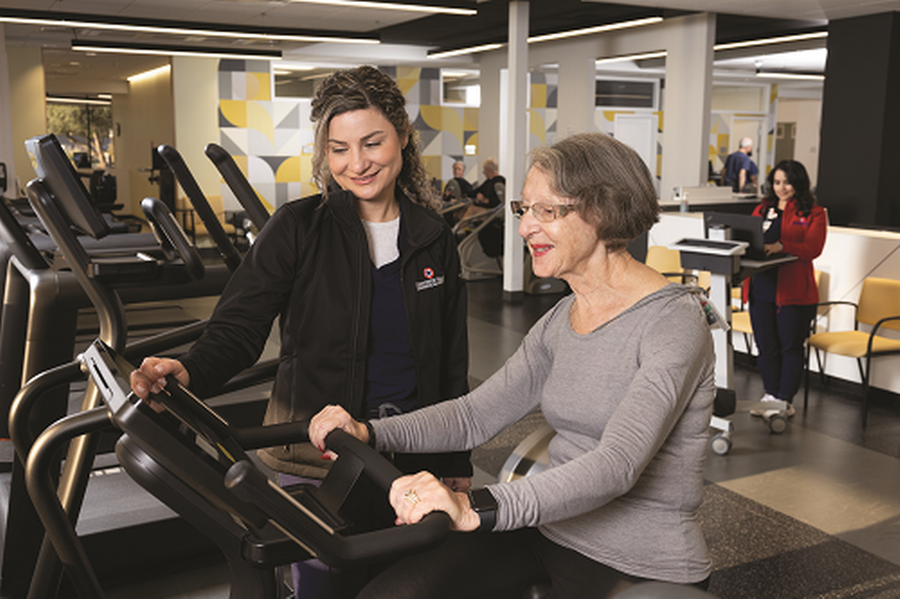Renker Wellness Center - Raising the Bar

Cardiac rehabilitation uses medically supervised exercise to strengthen the heart and body, while pulmonary rehabilitation focuses on reducing shortness of breath. In addition to exercise, a comprehensive cardiopulmonary rehabilitation program includes nutrition counseling, health coaching, stress management and lifestyle modification education. The program has a highly collaborative staff of registered nurses, respiratory therapists, exercise physiologists, registered dietitians, personal trainers, a healthy mindset coordinator, and a supervising physician. Patients treated at Eisenhower Health are automatically referred for rehabilitation, after a qualifying event. The program also accepts referrals from cardiologists or primary care physicians not affiliated with Eisenhower, as well as transfer patients from other programs.
The gym at the Renker Wellness Center is equipped with top-of-the-line treadmills, stationary bikes and resistance training apparatus from Technogym® and NuStep®. Users can monitor their workouts using the Technogym app. While part of the exercise area is open to Eisenhower staff, patients train in a separate area under the supervision of clinicians. Once they complete the program, they are invited to join the gym.
Getting started
Rehabilitation begins with a two-hour evaluation conducted by a nurse who will serve as the patient’s case manager. This session covers the patient’s medical history, medications, support system, lifestyle and any potential psychosocial issues. The evaluation concludes with a six-minute walk on a circular track to get a baseline of the patient’s strength and to identify any limitations such as balance, gait or joint issues. A Wellness Center exercise physiologist uses the results to tailor an exercise program to the patient’s needs, and the case manager schedules a consult with a dietitian. Pulmonary patients generally have up to 12 weeks of rehabilitation, while cardiac patients have 16 weeks. Medicare covers up to 18 weeks, or 72 sessions.
Following the evaluation, the patient chooses an intermittent daily schedule with each session consisting of an hour of supervised exercise followed by 30 to 60 minutes of education. Educational sessions include videos, lectures ranging from anatomy to stress reduction, a strength and balance class, a mind/body session of chair yoga or guided imagery, weekly live cooking demonstrations, and a one-on-one consultation with the dietitian. Diet modification is a critical element of cardiovascular rehabilitation. The Renker Wellness Center follows the Pritikin Intensive Cardiac Rehab Program and is the fifth busiest Pritikin center in the nation, and the largest in California. Dietitians work with patients individually to plan modifications for allergies, comorbidities, personal preferences or cultural considerations.
Small group sizes and shared goals bond program participants together. After completing their medical program, many participants join the community gym as a maintenance program and an opportunity to stay in touch — and stay healthy.
For more information, visit EisenhowerHealth.org/Cardiac.



